Who’s A-list and who’s a longshot in the race to replace Harry Reid
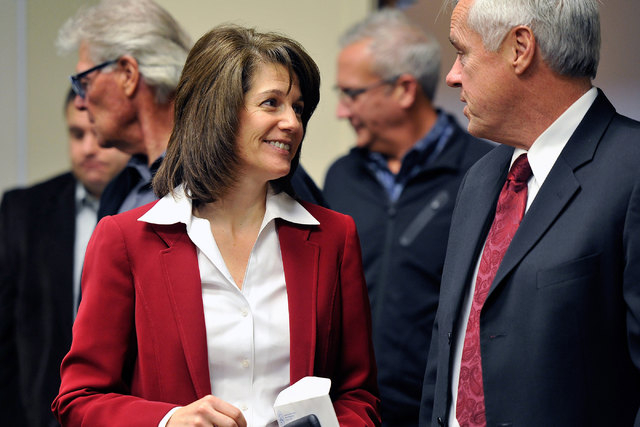
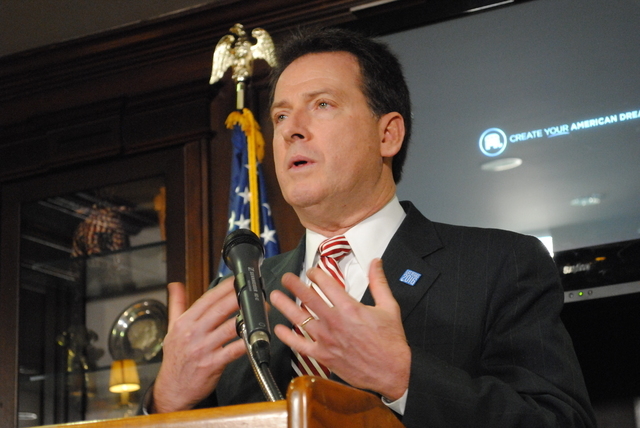
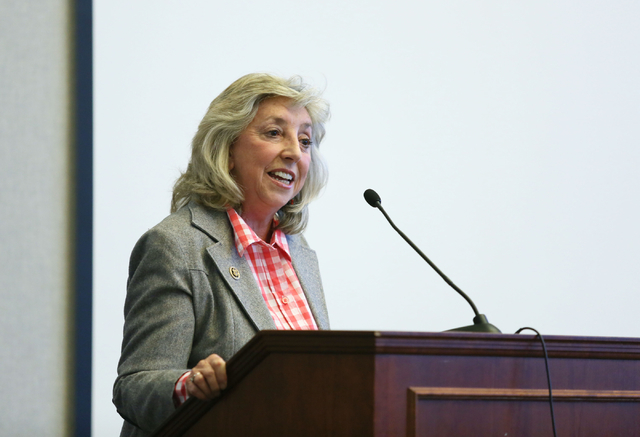
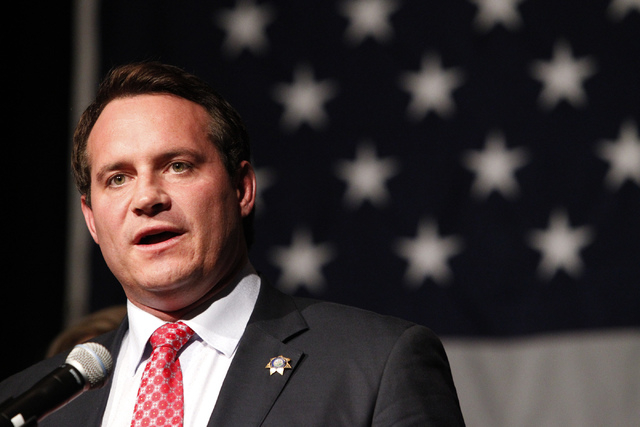
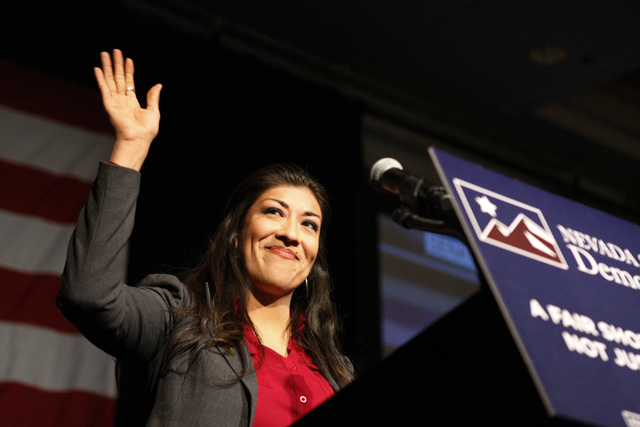
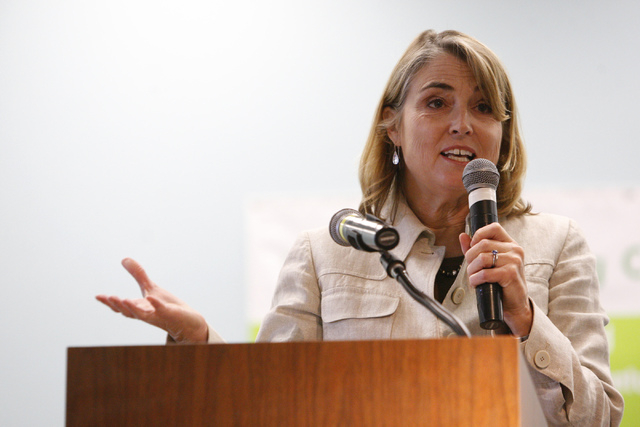
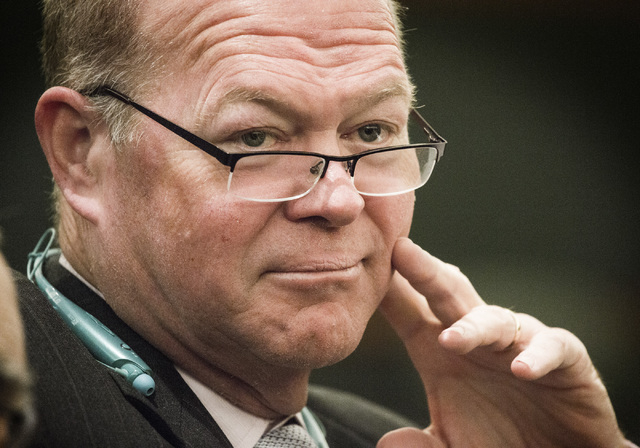
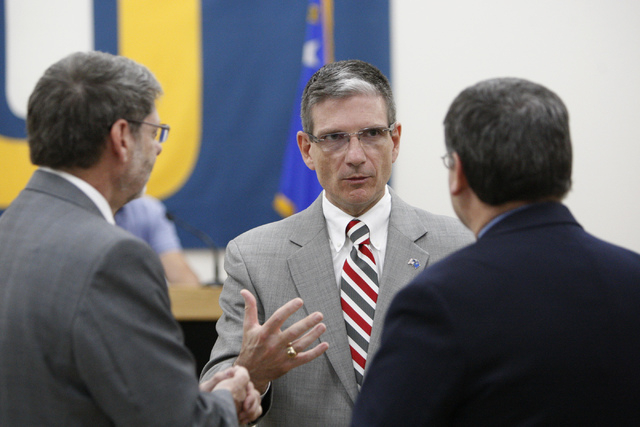
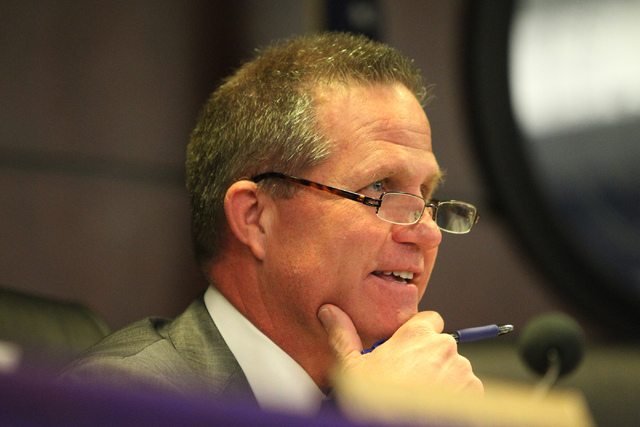
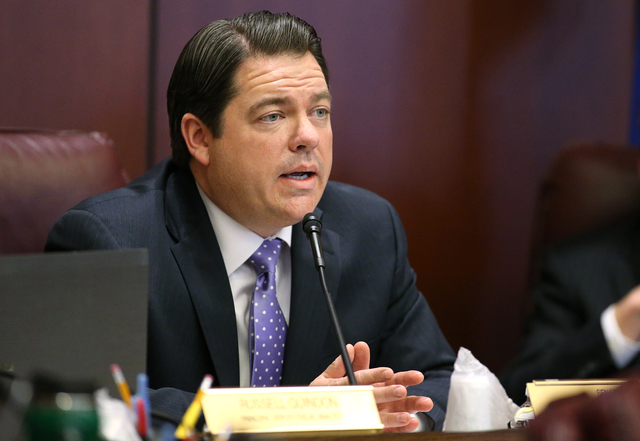
After U.S. Sen. Harry Reid, D-Nev., announced he will not run for a sixth term, political prognosticators declared the post a “toss-up,” with either party able to win the seat in 2016.
Republican Gov. Brian Sandoval immediately was declared the favorite to win, though the popular leader has said he isn’t interested.
On the Democratic side, Reid played the queenmaker, endorsing former Nevada Attorney General Catherine Cortez Masto to succeed him. Just days following his March 27 retirement announcement, Reid was in Las Vegas, plotting her path to victory, saying he would put his formidable machine behind her.
“We are going to do everything we can,” Reid told the New York Times over a bowl of chicken soup, settling into his new role of political Godfather. “I have to make sure I take care of the person running for Senate in Nevada.”
Several potential contenders already have taken themselves out of the running, from Reid’s eldest son, Rory, to former U.S. Rep. Shelley Berkley, D-Nev., who now runs Tuoro University in Nevada and California.
U.S. Rep. Joe Heck, R-Nev., said he would rather stay in the House, where he has served since 2011. But like Sandoval, the congressman likely will feel pressure from GOP leaders who want their best candidate in 2016’s hottest race after the presidency.
Meanwhile, Clark County Commission Chairman Steve Sisolak, a Democrat, said he’s preparing for re-election and “leaning no” on a Senate run. U.S. Rep. Mark Amodei, R-Nev., has said in the past that he’s not interested, although Reid’s retirement could change that. State Treasurer Dan Schwartz, a Republican, said he would consider running only if Sandoval and Heck do not.
Yet the list of Nevadans who could try to join Washington’s exclusive club of 100 remains fairly long. Reid’s retirement has shifted the electoral ground, prompting relative newcomers and political veterans alike to consider the possibilities. Here’s a report card on some of the potential contenders:
DEMOCRATS:
CATHERINE CORTEZ MASTO
Money — A+: Cortez Masto should have no trouble filling Senate campaign coffers in a race that could exceed 2010’s highly competitive race in which both Reid and Republican Sharron Angle each raised and spent more than $25 million. Outside groups just about matched the candidates’ spending.
On her own, Cortez Masto took in nearly $2.5 million for her elections in 2006 and 2010 and will have Reid as a rainmaker in 2016.
Since 2009, Reid has raised $23.6 million for his campaign committee, according to the Center for Responsive Politics. Reid also helped land $46.7 million for the 2012 midterm elections for the Senate Democrats’ super PAC, Senate Majority PAC. Reid’s own campaign committee held $1.5 million as of Sept. 30.
Experience — B: Cortez Masto served eight years as attorney general after a career as a criminal prosecutor for the U.S. Attorney’s Office in Washington, D.C., that gave her a taste of Capitol Hill.
Name Recognition — B: She’s held a high-profile statewide office for two terms and is a native Nevadan of Hispanic heritage. Her father, the late Manny Cortez, had a high profile in Southern Nevada as the longtime head of the Las Vegas Convention and Visitors Authority and was partly responsible for making the Strip a tourist mecca.
Liability/Asset — C: Cortez Masto hasn’t had a tough campaign and might not be ready for a rough-and-tumble Senate race. She declined to challenge Sandoval last year.
DINA TITUS
Money — B: Titus has never had trouble raising money. She raised about $1.1 million last year for a 1st Congressional District race that wasn’t very competitive. She raised nearly $2.6 million for the highly competitive 2010 campaign in the 3rd Congressional District, which she lost to Heck. For a Senate run she could expect a lot of support from outside groups such as Emily’s List.
Experience — B: Titus has survived the campaign crucible and runs strong. Even her losses in some of the state’s most competitive districts were close. In 2010 she lost to Heck by just 1,748 votes.
Name Recognition — B: Titus has been around Nevada politics for decades, including 20 years in the state Senate (1988-2008) where she rose to become minority leader. She also has a statewide profile, having run for governor and losing to Republican Jim Gibbons in 2006.
Liability/Asset — B: Titus, a native Georgian, has a thick Southern accent that can dissuade voters who favor native Nevadans. Strongly independent, she isn’t afraid to cross Reid and wouldn’t hesitate to challenge Cortez Masto if she thinks she can win. Titus in 2012 ran for the 1st Congressional District after Reid hand-picked state Sen. Ruben Kihuen, D-Las Vegas, for the open seat. Kihuen dropped out before the primary.
ROSS MILLER
Money — A+: Miller is a talented fundraiser who brought in $2.6 million for his failed 2014 attorney general campaign.
Experience — C: At age 30, Miller became the youngest Nevada secretary of state in 2006 and was re-elected in 2010. But he faced weak GOP challengers in both campaigns. In 2014, he lost his first truly competitive race to Adam Laxalt, a political newcomer who eked out a slim 4,750-vote victory, or 46.2 percent to 45.3 percent. Miller suffered in the low turnout race as Democrats stayed home, but his campaign also failed to turn voters against Laxalt.
Name Recognition — A: Miller held statewide office for eight years and boasts the highest social media profile among Nevada officials with nearly 17,500 Twitter followers. In addition, his father is Bob Miller, who was governor from 1989 to 1999.
Liability/Asset — C: Miller’s love of socializing proved his downfall against Laxalt. He reported accepting more than $70,000 in gifts while secretary of state, including tickets to sporting events such as the Ultimate Fighting Championship and football games where he sat in luxury skyboxes. Miller said some of the freebies were educational conferences. His opponents were able to exploit the gifts and question his ethics.
LUCY FLORES
Money — C: Flores raised nearly $754,000 in her failed 2014 race for lieutenant governor — not nearly enough to keep up with Republican Mark Hutchison, who raised about $2.5 million to win.
Experience — C: Flores served two terms in the Assembly, but neither of those elections featured tough competition. In 2010 she took 82.16 percent of the vote in the general election. She swept up 73 percent of the vote in a three-way primary in 2012 but faced no general election opponent at all.
Name Recognition — C: Little known outside of Clark County, her weak showing last year was her first statewide campaign. It focused on her bio — former gang member and high-school dropout who had an abortion as a teen, then went on to graduate from law school and enter politics. Inspiring to many, her hard-luck tale might not play well in conservative rural Nevada.
Liability/Asset — C: Hispanics comprise nearly 30 percent of Nevada’s population and Flores had the Latino vote last year, but she had trouble reaching other demographic groups statewide. She’s considered a long shot for a Senate bid but a better candidate for the 4th Congressional District.
KATE MARSHALL
Money — C: Her secretary of state campaign raised $715,245 last year but spent $100,000 more.
Experience — D: Marshall won two terms as state treasurer but failed in a 2011 special election for the 2nd Congressional District and lost the secretary of state job last year.
Name Recognition — C: Few Nevadans can name the state treasurer, even one who served two terms.
Liability/Asset — C: Her high-pitched voice can be grating; she’s a two-time loser in her most recent elections.
REPUBLICANS:
BOB BEERS
Money — B: He raised $152,000 in 2013 for his Las Vegas City Council campaign and has shown he can get bigger bucks when needed, including more than $500,000 for one past state Senate bid.
Experience — B: Beers served in the Nevada Assembly and Senate from 1999 to 2008 but was washed away by the Democratic wave that swept Barack Obama into the White House. He rebounded in 2012, beating eight other contenders in a Las Vegas City Council special election with 37 percent of the vote. The following year voters gave him a landslide re-election, with 76 percent of the vote.
Name Recognition — C: He ran in the 2006 GOP gubernatorial primary but isn’t widely known outside Clark County.
Liability/Asset — B: Beers is the first candidate to announce he’s running for Reid’s seat, putting out the word and 55,000 pamphlets in January 2014. An accountant, he’s known for asking lots of questions before spending taxpayer money and was a leader of the Assembly’s “mean 15” which blocked a proposed $1 billion tax hike in 2003.
BRIAN SANDOVAL
Money — A+: Running virtually unopposed, Sandoval raised about $3.7 million for his 2014 re-election, plus $1.4 million for his New Nevada PAC helping other GOP candidates. He raised more than $5 million to easily defeat Rory Reid in 2010.
Experience — B: The governor has served in all three branches of government as a member of the Nevada Assembly, state attorney general and as a federal judge. He’s never faced a tough campaign.
Name Recognition — A: Not only is Sandoval widely known, he’s also popular. More than 60 percent of Nevadans say he does a good job. No credible Democrat would run against him last year, and his re-election was a 71-percent landslide. He’s also gaining popularity among Nevada Latinos, who lean Democrat. Latino Decisions said exit polls showed Sandoval got 47 percent of the Hispanic vote in 2014, up from 15 percent in 2010.
Liability/Asset — Incomplete: Sandoval insists he doesn’t want to run for the Senate but instead is focused on finishing his second four-year term, which runs through 2018. How Sandoval comes out of the Nevada Legislature could affect his political future: Will lawmakers approve his $7.3 billion spending plan that includes $1.1 billion in new and extended taxes to fund education? Is he as “unbeatable” as some insiders say? Stay tuned.
JOE HECK
Money — A: Heck raised nearly $2.5 million for his 2014 campaign and spent less than $2 million. He would have no trouble raising big bucks for a Senate race from gaming interests and other major Nevada industries.
Experience — B: Heck has been able to hang on to his seat in the 3rd Congressional District for several elections, although it’s the state’s most competitive House district with an even Republican-Democrat split and independents leaning GOP. He’s also had a taste of defeat: In 2008 he lost his state Senate seat in a Democratic wave election that put President Barack Obama in office.
Name Recognition — C: Heck maintains a fairly low profile as a serious, workaday congressman, and he has never run a statewide race. That could put him at a disadvantage against someone with statewide campaign experience.
Liability/Asset — B: Heck’s promotion last year to brigadier general in the U.S. Army Reserve and past active duty as a doctor in Iraq make him an appealing candidate, particularly among Nevada’s large veteran population. But the moderate has come under fire from the left for voting with the conservative House caucus on hot-button issues such as immigration and equal pay. Heck said he’s staying put in the House, but 2016 could be his best chance to move up to the U.S. Senate.
BRIAN KROLICKI
Money — B: Krolicki hasn’t had a big-money race, although he raised $640,000 and spent $1.1 million in his first election for lieutenant governor in 2006. He raised about half that for his 2010 re-election.
Experience — B: He’s been around state government and GOP politics for a long time, serving two terms as state treasurer followed by two terms as lieutenant governor. He contemplated a run against Reid in 2010 but was sidelined by an ethics investigation that ultimately foundered.
Name Recognition — C: Krolicki has been on the statewide ballot four times, but remains relatively unknown.
Liability/Asset — D: His career took a hit with his 2008 indictment related to management of a college savings program while state treasurer. A judge later dismissed the felony charges, which Krolicki characterized as a partisan attack by then-Attorney General Cortez Masto.
MARK HUTCHISON
Money — A: Hutchison showed he can raise money — lots of it — even for the low-profile post of lieutenant governor. He raised at least $2.5 million to win a part-time job that puts him in line to replace Sandoval, if need be.
Experience — B: A newcomer to politics, Hutchison resigned his state Senate seat midterm to run for lieutenant governor as Sandoval’s choice. The stakes were high, but Hutchison sailed into office with 59.5 percent of the vote.
Name Recognition — C: Hutchison’s campaign attracted a lot of attention and he crisscrossed the state several times, yet he remains relatively unknown.
Liability/Asset — B: Sandoval’s support is a big plus. An attorney, Hutchison represented Nevada for free in its challenge to Obamacare — work that made him popular among conservatives but could hurt him among Democrats.
MICHAEL ROBERSON
Money — B: Roberson raised more than $600,000 last year toward his 2014 state Senate race, plus money for a PAC and other candidates, helping the GOP take control of the upper house.
Experience — C: His political career has taken off like a rocket since his first election to the state Senate in 2010. But the Senate majority leader never has been tested in a statewide race.
Name Recognition — C: His state Senate leadership gets his name out there, but his lack of a statewide run means he’s not that widely known. On the plus side, his base is Clark County, home to 75 percent of all Nevadans.
Liability/Asset — B: Roberson first ran as a strict conservative but has become a moderate over time. He’s now pushing for Sandoval’s $7.3 billion general fund budget and $1.1 billion package of new and extended taxes. This could hurt him in any GOP primary but help him during a general election. Insiders say family considerations and a desire to stay in the Legislature weigh against a U.S. Senate race, for now.
ADAM LAXALT
Money — A: Laxalt surprised many observers by raising more than $1.8 million in his first political campaign to score an upset over better-financed Ross Miller in last year’s attorney general race. He tapped conservatives in Washington, D.C., where his mother, Michelle Laxalt, was a widely known lobbyist. Acquaintances of his grandfather, former Nevada Gov. and U.S. Sen. Paul Laxalt, also ponied up.
Experience — C: Laxalt was a Navy judge advocate general and a lawyer in a private practice in Las Vegas. But he has only lived in Nevada for a few years and has run just one campaign. He would be sorely tested in a high-stakes contest that could decide which party controls the U.S. Senate.
Name Recognition — B: Laxalt’s family name helped him win support statewide. He also spent a lot of time traveling the dusty roads to reach every corner of Nevada last year.
Liability/Asset — C: During the campaign, an operative leaked a memo from a Laxalt job review at the private firm, Lewis Roca, where he worked. It said he had sloppy legal skills and was “a train wreck” as a lawyer. His campaign countered by releasing rave reviews he got in the military, including when he oversaw terrorism cases in Baghdad. Laxalt has suggested he wants to focus on his new job but hasn’t ruled out a Senate bid.
Contact Laura Myers at lmyers@reviewjournal.com or 702-387-2919. Find her on Twitter: @lmyerslvrj.


















